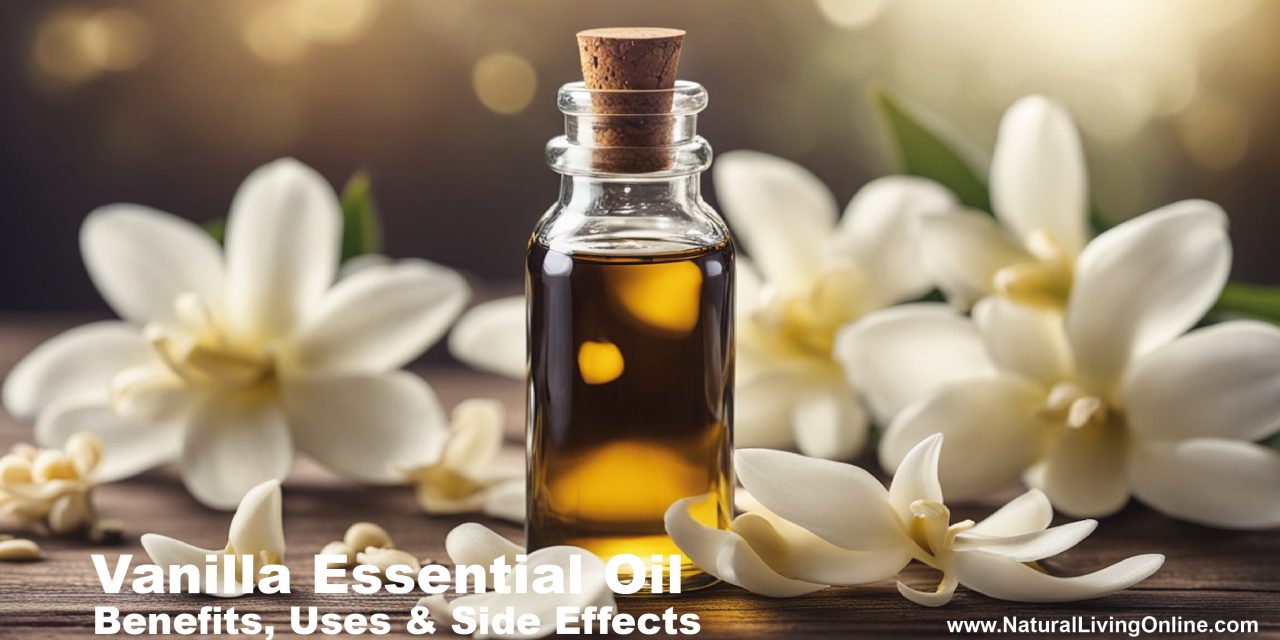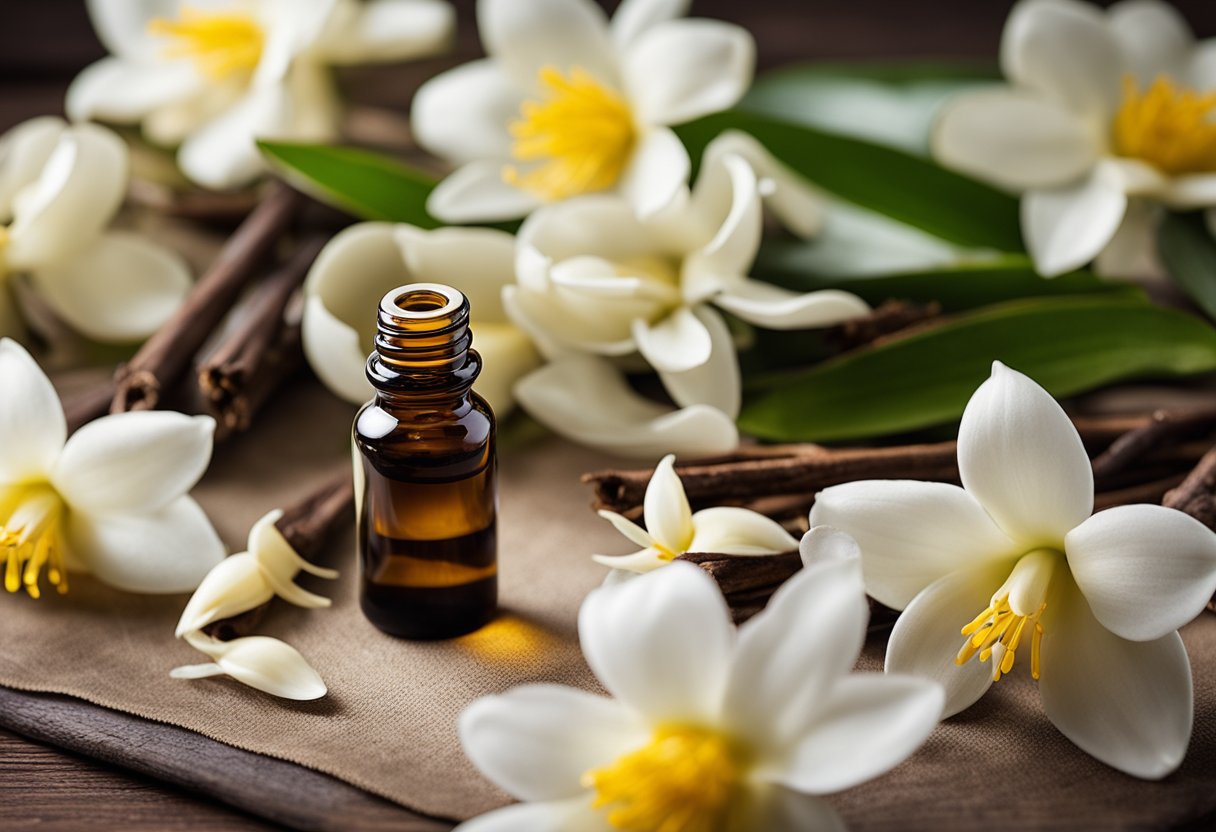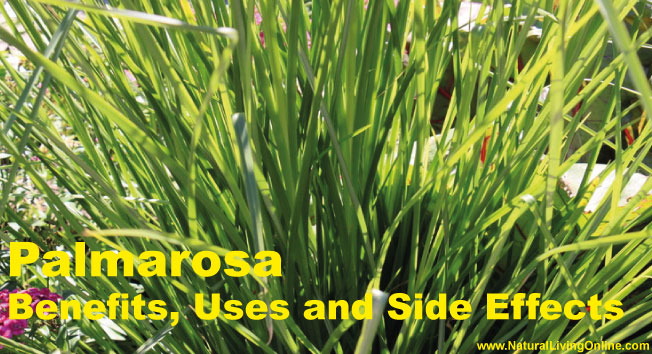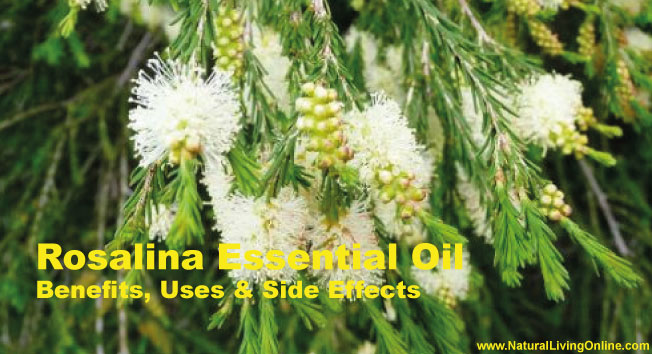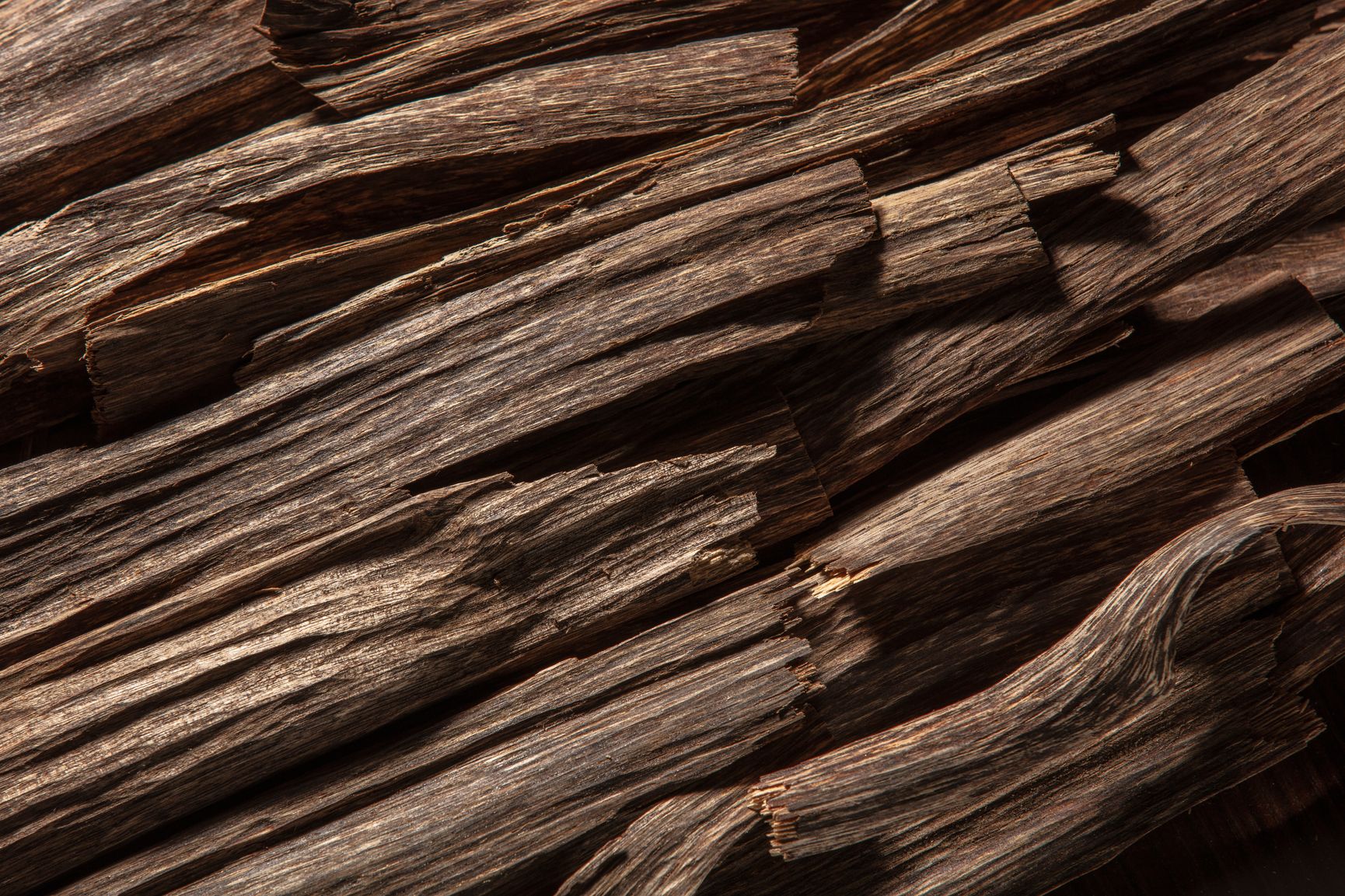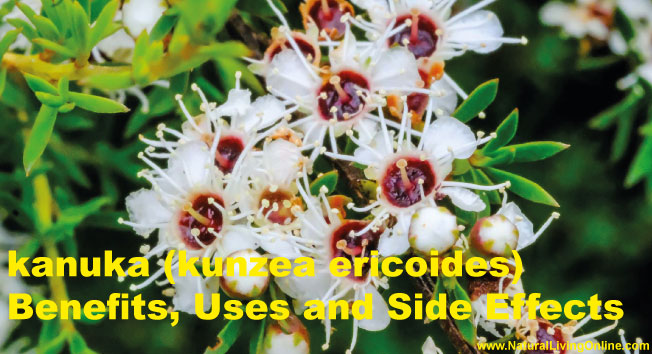Vanilla essential oil, extracted from the beans of the Vanilla planifolia plant, carries not only a sweet and comforting aroma but also a myriad of benefits for wellness and beauty. Prized for its delightful scent, vanilla essential oil has a long history of use in perfumery, flavorings, and traditional medicine. Its warm, inviting fragrance is often associated with feelings of relaxation and pleasure, making it a popular ingredient in aromatherapy and stress-reduction practices.
The essence of vanilla is rich in specific compounds that contribute to its characteristic scent and potential health benefits. Various methods, including CO2 extraction and enfleurage, are employed to capture the aromatic oils of vanilla, each contributing to the oil’s unique chemical composition. This essential oil is commonly blended into personal care products, not just for its fragrance but also for its potential to support skin and hair health.
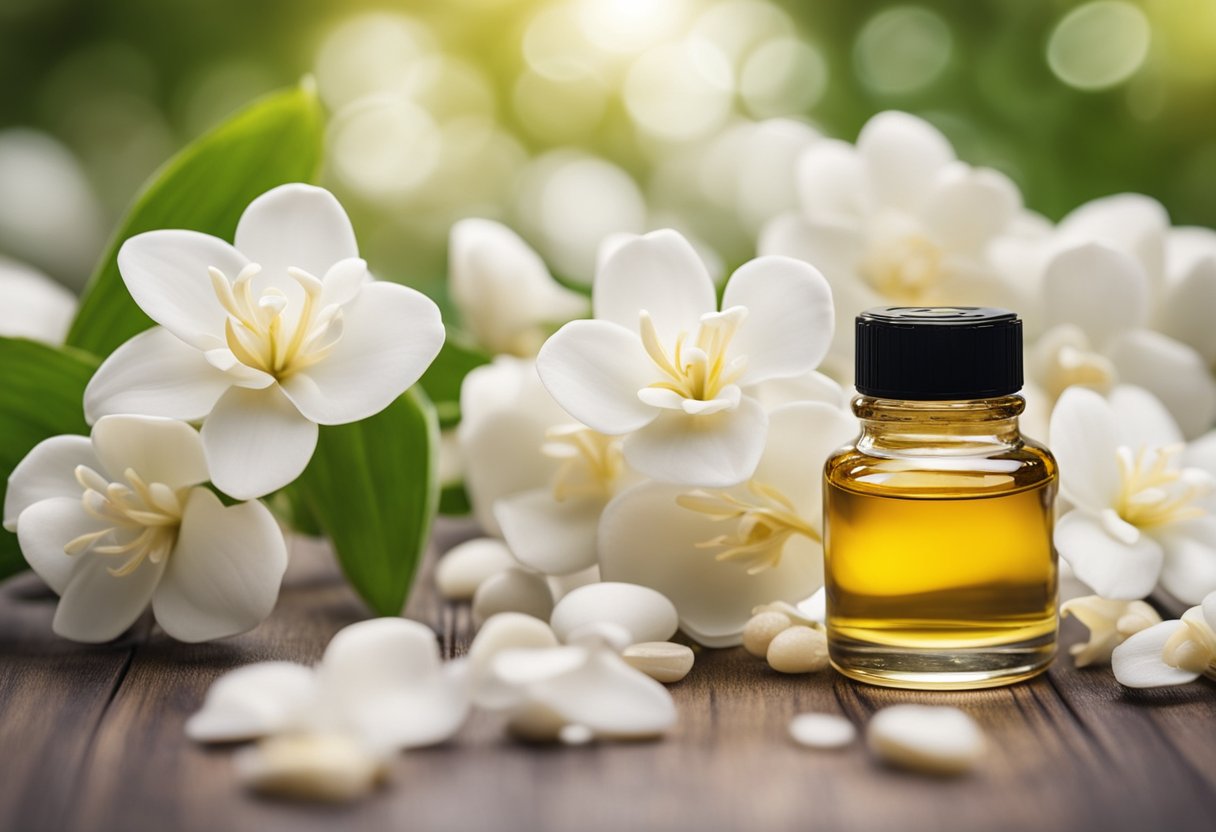
Key Takeaways
- Vanilla essential oil offers a sweet aroma and potential stress-relief properties.
- It contains compounds that may benefit skin and hair health.
- The oil should be used cautiously to avoid possible side effects.
Essential Oil Profile
Therapeutic Uses and Health Benefits
Vanilla essential oil is renowned for its wide array of health benefits ranging from mood enhancement to skin and hair care. It’s a versatile essential oil used in various therapeutic settings to support overall wellness.
Aromatherapy and Mood Improvement
Vanilla essential oil is commonly used in aromatherapy to promote emotional well-being. Its sweet and comforting scent is known to reduce stress and anxiety. Inhaling this oil can help to calm the nervous system and create a sense of peace and relaxation. Research has highlighted its potential as a sedative, helping to alleviate restlessness and promote better sleep.
Skin and Hair Care Benefits
For skin care, vanilla essential oil is often incorporated into routines to help maintain healthy skin and reduce inflammation. Its antibacterial properties make it suitable for preventing and treating acne, while its antioxidant action can aid in anti-aging efforts, helping to protect the skin from environmental stressors. When used in hair care, the oil can help to nourish and condition, giving hair a silky, healthy sheen. Due to these properties, vanilla essential oil is a favorite addition in various skincare and haircare formulations.
Support for Overall Wellness
Vanilla essential oil offers benefits beyond its calming aroma and skin-friendly attributes. It can be an ally in a holistic approach to wellness, assisting with muscle pain relief and providing support for a healthy circulatory system. As a part of a well-rounded health routine, using vanilla essential oil can contribute to overall wellness, including aiding in lowering blood pressure when used properly and in moderation. However, proper usage is key, as essential oils can cause adverse reactions if used improperly.
Practical Applications and How to Use
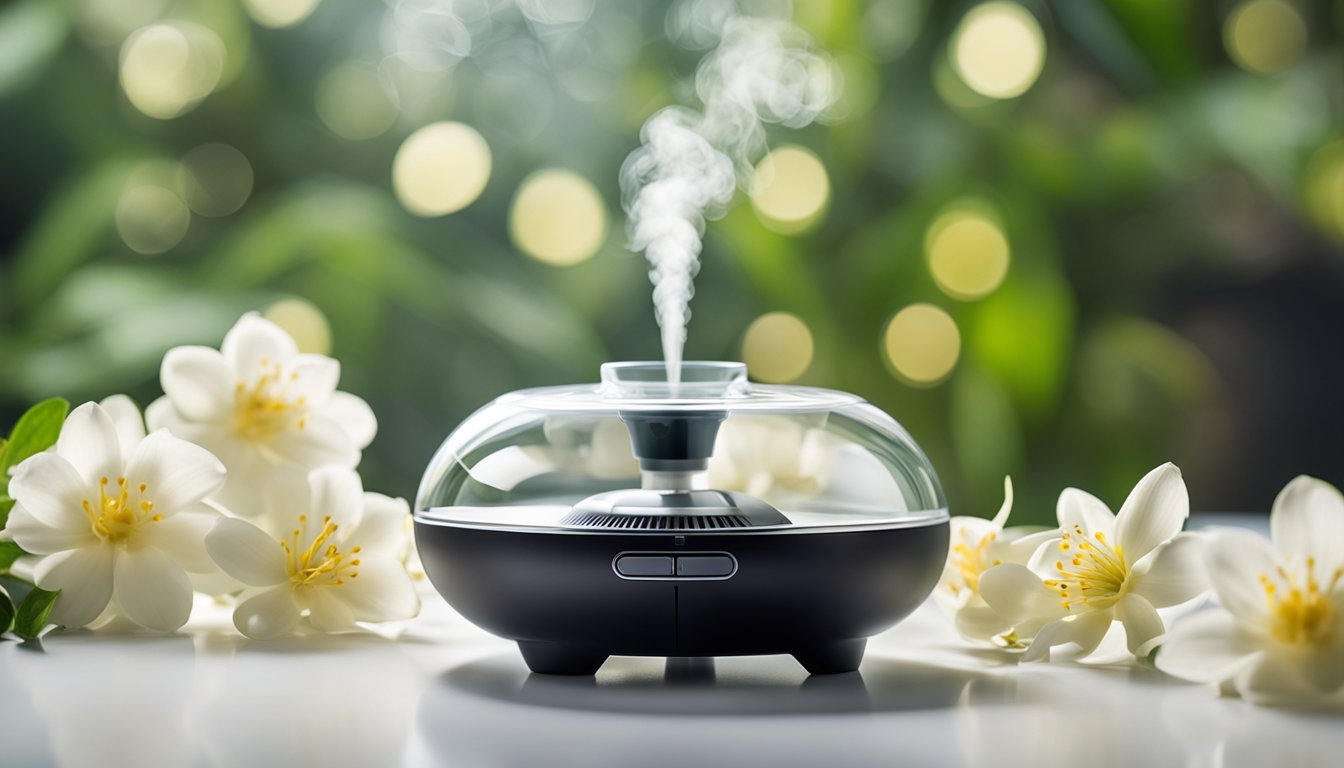
Vanilla essential oil can be a versatile addition to both aromatherapy practices and culinary applications. Ensuring its proper use can maximize benefits while minimizing risks.
In Perfumery and Fragrance Creation
Vanilla essential oil is commonly used in perfumery due to its warm, comforting scent. To incorporate it into homemade fragrances, start by using it as a base note. A typical application would involve blending several drops of vanilla essential oil with a carrier oil, like jojoba or almond oil, to create a personal scent. The oil can also be added to a diffuser to infuse a room with its rich aroma. These methods leverage the calming and pleasant qualities of vanilla in aromatherapy.
- Perfume Blend Example:
- 5 drops vanilla essential oil
- 10 ml carrier oil
Blend the ingredients and apply to pulse points for a natural fragrance.
As a Flavoring Agent
Employing vanilla essential oil as a flavoring agent involves careful measurement and blending due to its potent nature. In culinary uses, the oil should be diluted before adding a few drops to enhance sweet dishes and beverages. A trusted method involves first combining vanilla essential oil with a neutral-tasting carrier substance, such as coconut oil, before incorporating it into the recipe to ensure even distribution of flavor.
- Flavoring Method:
- 1-2 drops vanilla essential oil
- 1 tablespoon coconut oil or another carrier
Mix thoroughly and then integrate into the final dish.
Safety Profile and Side Effects
Vanilla essential oil is admired for its sweet aroma and therapeutic properties. However, users must be aware of the potential side effects and adhere to safety precautions to avoid adverse reactions.
Potential Side Effects
Vanilla essential oil, when used in aromatherapy or applied topically, is generally considered safe. However, side effects can occur, especially if the oil is used improperly. These may include:
- Skin Irritation: Some individuals, especially those with sensitive skin, may experience redness, itching, and swelling after applying vanilla essential oil directly.
- Allergic Reactions: There is a risk of allergic reaction, characterized by symptoms such as hives or difficulty breathing, particularly in those with a pre-existing allergy to vanilla or similar botanicals.
Precautions and Best Practices
To minimize potential risks associated with vanilla essential oil, it is essential to follow precautions and best practices:
- Topical Application: Dilute the essential oil with a carrier oil before applying it to the skin to prevent irritation.
- Ingestion: The ingestion of vanilla essential oil is generally advised against by experts, such as the National Association for Holistic Aromatherapy (NAHA), due to the lack of safety data and potential toxicity.
- Medical Conditions: Those with medical conditions should consult a healthcare provider before using vanilla essential oil, as it may interact with certain health issues or medications.
By observing these guidelines, users can enjoy the aromatic benefits of vanilla essential oil while minimizing the risk of adverse effects.
Frequently Asked Questions
Are there any known side effects or risks of using vanilla essential oil?
While vanilla essential oil is generally considered safe for topical use, it can cause side effects such as redness, irritation, itching, and swelling in some individuals, especially if used undiluted. Always conduct a patch test prior to use and consult a healthcare professional before using vanilla essential oil, especially for those with pre-existing medical conditions or allergies to vanilla.
Can vanilla essential oil be applied directly to the face, and what should one consider?
It is not recommended to apply vanilla essential oil directly to the face without proper dilution. Concentrated vanilla essential oil can cause irritation or allergic reactions; thus, blending with a carrier oil and testing on a small skin area first is crucial.
What are some spiritual benefits associated with vanilla essential oil?
In spiritual practices, vanilla essential oil is believed to have grounding properties that may help ease anxiety and promote emotional well-being. Its warm, comforting scent is often utilized to enhance meditation sessions and spiritual rituals, encouraging relaxation and concentration.
Are there any specific benefits of vanilla essential oil for hair health?
Vanilla essential oil might contribute to hair health by imparting a pleasing fragrance and improving texture when mixed with carrier oils. It’s sometimes used to give a silky sheen to the hair and may help in managing frizz.
How can vanilla essential oil be used in a diffuser and what are its advantages?
In a diffuser, vanilla essential oil can create a calming atmosphere, potentially aid in stress relief, and enhance mood. Adding 5 drops of vanilla essential oil to a diffuser blends its sweet fragrance with the air, fostering a tranquil environment that can contribute to relaxation and mental clarity.
What are the potential skin benefits of using vanilla essential oil?
Using vanilla essential oil may improve skin health due to its properties as an antioxidant and its potential to promote relaxation, alleviate stress, and contribute to a more restful sleep. It’s important to dilute the essential oil with a carrier oil to avoid skin irritation. Health benefits of vanilla essential oil include its soothing effects which might be beneficial in minimizing the signs of aging and helping in skin repair.
References
Vanilla: Potential Health Benefits
Efficiency of Vanilla, Patchouli and Ylang Ylang Essential Oils
This website does not provide medical advice.
All information provided on this website, and on associated social media networks, including but not limited to texts, images, and numbers are for general information purpose only. It is not intended as medical advice and it does not include all possible precautions, side effects, or interactions that may occur. Neither NaturalLivingOnline.com nor its author/founder take responsibility for how you use this information. Statements contained on NaturalLivingOnline.com have not been evaluated by the FDA. You should conduct thorough research via multiple sources and consult your physician or qualified doctor before using any essential oil or herbal remedy. Information on NaturalLivingOnline.com must not be relied upon for medical, legal, financial or other decisions.

